ex-, e-, ef-
(Latin: a prefix occurring in words of Latin origin used in the senses: out, out of, from; upward; completely, entirely; to remove from, deprive of; without; former [said of previous holders of office or dignity])
Before f, ex- becomes ef-; before all voiced consonants (as b, d, g, etc.) ex- becomes e-.
expel (verb), expels; expelled, expelling
1. To force or to drive out: The military forces were able to expel the invaders.
2. To officially force someone to leave a place or an organization: The university will be expelling those students who refuse to attend their classes and to complete their assignments.
3. To push or to force something out: Jack, the patient, expelled or exhaled air from his lungs.
2. To officially force someone to leave a place or an organization: The university will be expelling those students who refuse to attend their classes and to complete their assignments.
3. To push or to force something out: Jack, the patient, expelled or exhaled air from his lungs.
expire (verb), expires; expired; expiring
1. To be no longer valid after a period of time: "Dee's driver's license is about to expire."
2. To die: "Audra's aunt expired after an extended illness."
3. To breath air out: "The doctor measured the the volume of air that Rhoda expired from her lungs."
2. To die: "Audra's aunt expired after an extended illness."
3. To breath air out: "The doctor measured the the volume of air that Rhoda expired from her lungs."
explicit (ik SPLIS it) (adjective), more explicit, most explicit
1. Pertaining to the expression of details in a clear and obvious way, leaving no doubt as to the intended meaning: Shirley was asked by her teacher to have a more explicit explanation about what the words mean in the essay that she wrote for her English class.
2. Describing something which is definite and not implied or guessed at: Henry didn't have explicit information about the decision his company made regarding the new investment.
3. Regarding anything that is shown or expressed clearly and openly, without hiding anything: The teacher gave his students explicit instructions as to how they should complete the writing assignment.
4. Etymology: from French explicite, from Latin explicitus. "unobstructed", from explicare, "to unfold, to unravel, to explain"; from ex-, "out" + plicare, "to fold".
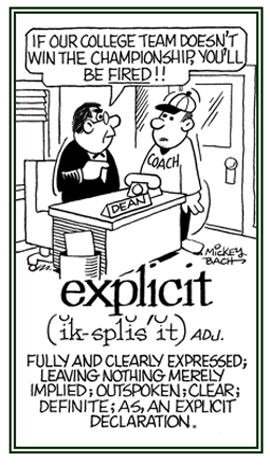
© ALL rights are reserved.
Go to this Word A Day Revisited Index
2. Describing something which is definite and not implied or guessed at: Henry didn't have explicit information about the decision his company made regarding the new investment.
3. Regarding anything that is shown or expressed clearly and openly, without hiding anything: The teacher gave his students explicit instructions as to how they should complete the writing assignment.
4. Etymology: from French explicite, from Latin explicitus. "unobstructed", from explicare, "to unfold, to unravel, to explain"; from ex-, "out" + plicare, "to fold".

Go to this Word A Day Revisited Index
so you can see more of Mickey Bach's cartoons.
Information that can express thoughts and ideas clearly and is easily transmitted to others: Some of the most common forms of explicit knowledge includes manuals, documents, instructional procedures, and videos that explain how to do something.
explicitly
expropriate (verb), expropriates; expropriated; expropriating
To take property or money from someone, either legally for the public good or illegally by theft or fraud: The local government had no other choice than to expropriate a strip of land from its owner in order to build a useful road for the other residents in the area.
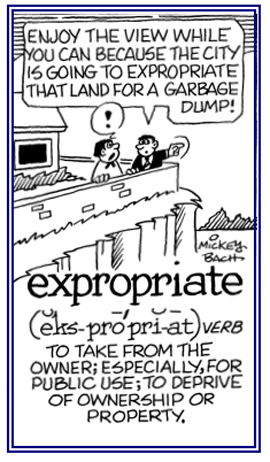
© ALL rights are reserved.
Go to this Word A Day Revisited Index

Go to this Word A Day Revisited Index
so you can see more of Mickey Bach's cartoons.
exterminate (verb), exterminates; exterminated; exterminating
To get rid of or to completely destroy anything that is considered to be a pest or undesirable: Larry, the landlord, called in a pest control company to exterminate all of the cockroaches that had invaded the house that he was hoping to rent.
extol, extoll (verb); extols, extolls; extolled; extolling
1. To praise highly; to laud; to eulogize: Professor Stanley extolled the wonderful contributions to the linguistics section of the university that were made by his retiring colleague.
2. To commend, to glorify, or to honor: The health benefits of exercising have been extolled by the elderly couple who have been attending a fitness studio for years and going for walks on many occasions.
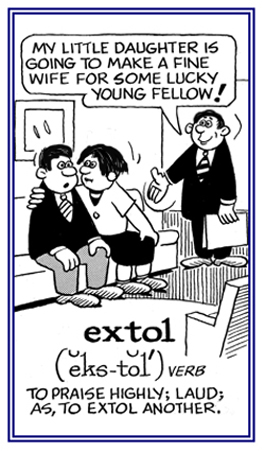
© ALL rights are reserved.
Go to this Word A Day Revisited Index
2. To commend, to glorify, or to honor: The health benefits of exercising have been extolled by the elderly couple who have been attending a fitness studio for years and going for walks on many occasions.

Go to this Word A Day Revisited Index
so you can see more of Mickey Bach's cartoons.
extort (verb), extorts; extorted; extorting
1. To obtain something; such as, money or information from someone by using force, threats, or other unacceptable methods.
2. To obtain something from another person by coercion or intimidation.
3. To compel, or to coerce, as with a confession or information, by any means serving to overcome the other's power of resistance; therefore, making the confession or admission legally involuntary.
4. To gain by wrongful methods; that is, to obtain in an unlawful manner, as when someone compels payments by means of threats of injury to person, property, or reputation.
5. The natural meaning of the word extort is to obtain money or other valuable things by compulsion, by actual force, or by the force of motives applied to the will, and often more overpowering and irresistible than physical force.
2. To obtain something from another person by coercion or intimidation.
3. To compel, or to coerce, as with a confession or information, by any means serving to overcome the other's power of resistance; therefore, making the confession or admission legally involuntary.
4. To gain by wrongful methods; that is, to obtain in an unlawful manner, as when someone compels payments by means of threats of injury to person, property, or reputation.
5. The natural meaning of the word extort is to obtain money or other valuable things by compulsion, by actual force, or by the force of motives applied to the will, and often more overpowering and irresistible than physical force.
1. The crime of obtaining something; such as, money or information from someone by using force, threats, or other unacceptable methods: Someone tried to use extortion by calling an elderly woman and falsely claiming that he was her nephew and that he needed money so he could travel back home and he would visit her at her apartment to pick it up the next day; however, a woman showed up and claimed she was there to get the money for the nephew.
3. Etymology: from Latin extorquere, "to wrench out, to wrest away"; from ex-, "out" + torquere "to twist".
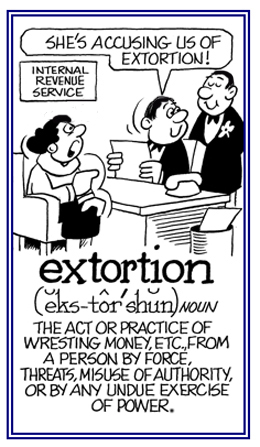
© ALL rights are reserved.
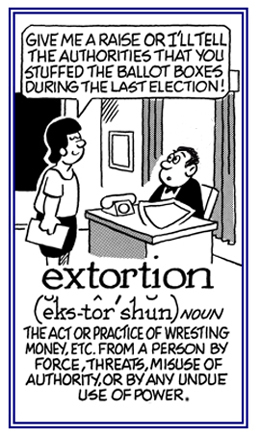
© ALL rights are reserved.
Go to this Word A Day Revisited Index
Fortunately, the police had been informed by the elderly lady and they were waiting to arrest the woman and, later, the so-called nephew for their criminal extortion.
2. The illegal use of someone's official position, or powers, to obtain property, funds, or patronage: A secretary of a businessman threatened extortion by saying she would turn him in for embezzling money from his company unless he paid her a sum of cash.3. Etymology: from Latin extorquere, "to wrench out, to wrest away"; from ex-, "out" + torquere "to twist".


Go to this Word A Day Revisited Index
so you can see more of Mickey Bach's cartoons.
extortionate (adjective), more extortionate, most extortionate
1. Greatly exceeding bounds of reason or moderation; exorbitant; immoderate: Sally's parents didn't realize that the dessert following their dinner at the restaurant was an extortionate amount, or huge helping, of ice cream! After finishing it, Sally felt sick to her stomach!
2. Highly excessive, especially in price: The young couple was absolutely astounded by the extortionate price of the little house and garden because they would have to get a large credit from the bank to purchase it.
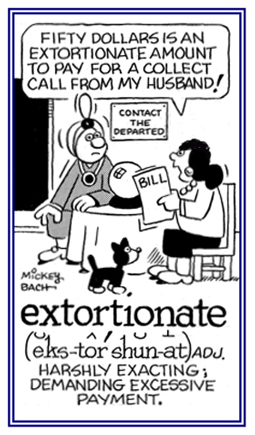
© ALL rights are reserved.
Go to this Word A Day Revisited Index
2. Highly excessive, especially in price: The young couple was absolutely astounded by the extortionate price of the little house and garden because they would have to get a large credit from the bank to purchase it.

Go to this Word A Day Revisited Index
so you can see more of Mickey Bach's cartoons.
extortionately (adverb), more extortionately, most extortionately
1. In a manner that greatly exceeds what is reasonable or moderate.;
2. To an exorbitant degree.
2. To an exorbitant degree.
1. A criminal who extorts money from people by threatening to expose embarrassing information about them.
2. A person who obtains something by force or threat.
2. A person who obtains something by force or threat.
Anyone who commits a criminal offense which occurs when a person either unlawfully obtains money, property, or services from someone, an entity, or an institution through illegal coercion or intimidation.
Someone who profits not by what he knows or whom he knows, but what he knows about that person.
extortive (adjective), more extortive, most extortive
1. A reference to being oppressive, violent, or unjust: "He claimed that the confession had been forced from him by the extortive police."
2. A descriptive term for someone who seizes something forcibly by violent or unlawful means from an unwilling person by physical force, a menace, duress, torture, or any undue or illegal exercise of power or ingenuity: "An extortive person is anyone who forces contributions from otherwise unwilling victims; who gets confessions of guilt by coercion; or who uses threats to obtain a promise."
2. A descriptive term for someone who seizes something forcibly by violent or unlawful means from an unwilling person by physical force, a menace, duress, torture, or any undue or illegal exercise of power or ingenuity: "An extortive person is anyone who forces contributions from otherwise unwilling victims; who gets confessions of guilt by coercion; or who uses threats to obtain a promise."


